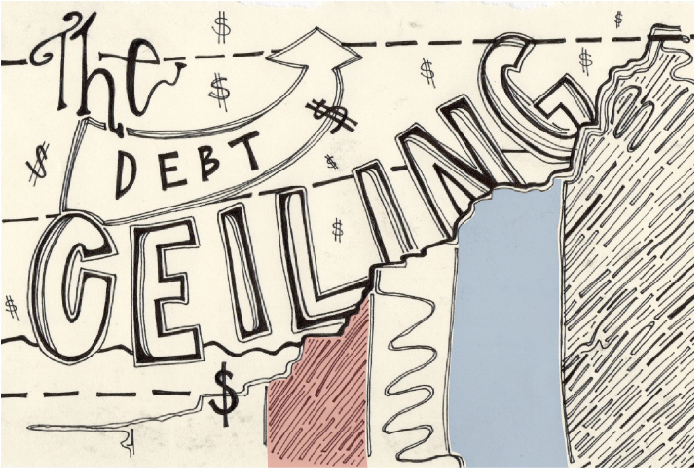U Professors Explain Debt Ceiling Crisis
(Design by Mary Allen | The Daily Utah Chronicle)
May 30, 2023
Many students may have heard the recent news about the debt ceiling crisis, but may not know exactly what it means. Essentially, the U.S. hit its debt limit in Jan. which risks the government defaulting on its debts.
On May 28, House Speaker Kevin McCarthy and President Joe Biden reached a deal to avoid defaulting. The proposed bill will still have to be discussed by Congress and be voted on by May 31 to give the Senate enough time to review the bill.
According to the Associated Press, the bill would suspend the debt ceiling through 2025 and avoid a federal default.
The “Fiscal Responsibility Act” would also end the pause on student loan repayments in August.
Utah Sen. Mike Lee has been vocal about his views on suspending the debt ceiling on Twitter.
“I will use every procedural tool at my disposal to impede a debt-ceiling deal that doesn’t contain substantial spending and budgetary reforms,” Lee tweeted on May 25. “I fear things are moving in that direction. If they do, that proposal will not face smooth sailing in the Senate.”
In a statement posted on Twitter May 29, Sen. Mitt Romney said the bill was a good bipartisan compromise.
“The deal is good for the country in that it prevents a default and subsequent financial meltdown, while also limiting spending,” the statement said.
University of Utah political science professor Jim Curry has specialized in U.S. politics and policymaking throughout his time teaching. Curry explained how the debt crisis has worked over time, and what makes it different than previous occurrences.
“The way our statutes work is that the country can borrow up to a certain amount of money, and then it needs statutory approval from Congress and the president to borrow more,” he said. “So that means periodically, we run into a point … in which the country is borrowing money to fulfill its debts.”
Curry explained that the U.S. has reached its debt limit before with little controversy, but this time is different, marked by increasing divides between the two political parties.
“The debt limit gets caught up in broader political controversies,” he said. “We have now Republicans, who took a new majority in the House of Representatives after the 2022 midterms, [who] want to leverage this moment to try to force the government to spend less.”
Curry added, “Democrats want to have a clean debt ceiling increase, which is what happens most of the time, and now they’re sort of stuck in a sort of a standoff.”
It’s unclear what will happen if June 5 arrives with no movement in the debt obligations, according to Curry. He explained it could follow the patterns of earlier instances, where it happens fairly cleanly, or it could lead to some sort of financial or economic crisis, like a recession. According to Curry, the U.S. has never been in a situation where it could not pay its financial obligations.
If the U.S. were to default, there would be implications regarding the country’s credit rating. Curry compared this to when a person’s credit score drops due to late payments.
Curry added there’s no clear view into what the Biden administration’s priorities would be if this were to happen because it doesn’t want to take down spending limits, which is the Republicans’ pitch.
The administration has also not given any insight to what their plan B is, because they do not want to legitimize the possibility that they will have to prioritize debt payments, according to Curry.
Another thing that may happen if the June deadline is reached with no compromise is the damage it would do to student loans and government-funded scholarships.
Korkut Erturk, economics professor at the U, said in an email interview that student loans are just one of many things that could be financial disasters in the case of a default.
“Asking what would happen with student loans is a bit like asking what would happen to the furniture if the house is blown up,” he said
Curry said he thinks government-funded loans and grants would be affected. In case of a recession, there would be less money available for funding public education as well.
This is not likely to happen, because both parties have stated that they are committed to finding a solution, and it would mean that no compromise would be made between political parties until August.
Erturk said he doesn’t think a default is likely, but is not willing to completely rule it out.
“I think of the whole thing as a big farce,” he said. “A default won’t happen or if it does it will go on for a very short time. The trouble is that so much of politics these days is farcical that it is not easy to completely rule it out on rational grounds.”









